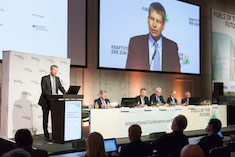“Into the Future – Driven by Climate Protection!” — Kick-off for the 22nd “Fuels of the Future” International Conference
20 January 2025
Marlene Mortler, Chair of the German Bioenergy Association (BBE), opened the two-day “Fuels of the Future” conference. The first of fifteen sessions discussed targets for climate change mitigation in the transport sector and highlighted the potential of sustainable fuels and drive technologies. Marlene Mortler addressed the future challenges facing renewable fuels in an increasingly complex regulatory and market environment: ‘With a view to closing the climate change mitigation gap and ensuring all renewable options develop their full potential, the greenhouse gas reduction quota must be significantly increased to at least 37 percent in 2030 and must also be extended to 2040 to ensure long-term planning security. Germany is currently squandering considerable potential for climate change mitigation as a consequence of the artificially low cap for crediting of sustainable biofuels from cultivated biomass; as part of RED III implementation, this cap should be raised to 5.3 per cent, as authorised by European legislation”.
Hartmut Höppner, State Secretary at the Federal Ministry for Digital and Transport (BMDV), explained in his presentation how renewable fuels can be used to make up for the shortfall in climate change mitigation in the world of transport: “Renewable fuels are important to achieving our climate targets in the transport sector. They enable climate-neutral operation of existing technologies. A clear legal framework is vital to boosting their potential rapidly. By combining this with targeted financial support, we can thus create incentives for investments to ramp up climate-friendly fuels and thus ensure more climate change mitigation.”
Niels Anspach, Vice President, Biofuels Supply Chain at BP Europa SE, explained how biofuels can accelerate the transition to net zero in various industries: “The most cost-effective solutions, such as HEFA, should be prioritised, while new feedstocks and new technologies, for example Fischer-Tropsch or methanol-to-jet, should be developed and utilised. Instead of
limiting the options, all pathways should be explored and deployed at their own pace, in a holistic approach that does not place limitations on any of the sustainable options”.
In her presentation, Claire Couet, Business Development Manager at SGS Inspire, highlighted what we can expect from decarbonisation of Europe's transport sector by 2030: “The European Union's ambitious climate agenda will remain a driving force shaping the future of road transport. However, the EU faces an important decision on whether to expand the role of e-fuels and other renewable fuels as part of its decarbonisation strategy, alongside electrification. This decision could significantly influence the European automotive industry’s future and its ability to remain competitive on the global stage.”
Jörg Hübeler, Head of Market Development EU & APAC, Transport & Industry at Neste, and Dr. Lars Menger, Technical Project Manager at the BMW Group, underscored the potential and ambitions for renewable fuels in RED III implementation in Europe: “We would like to thank BMW for their trust and look forward to working together in future”, Joerg Hübeler commented. “Renewable diesel plays an important role worldwide as we move towards sustainable mobility. The first refuelling of BMW vehicles in Germany with renewable diesel from Neste offers clients a chance to experience first-hand the significant reduction in greenhouse gas emissions that renewable diesel offers without compromising on vehicle performance”
In his presentation, Prof. Dr.-Ing. Christian Küchen, Managing Director of en2x – Fuels und Energy Industry Association e.V., highlighted the regulatory obstacles to investment in innovative technologies for green molecules: “The molecular transition is fundamental to a successful energy transition. A strong economy can only be reconciled with climate change mitigation if CO2-neutral fuels, combustibles, and chemical feedstocks are available for industry. In order to ensure that the transformation can finally pick up speed, urgent action is needed from the incoming German government to set the course by introducing legislative provisions that make investments in green technologies as attractive as possible. None of the alternatives should be excluded out of hand due to bans. We need to slash bureaucracy and foster competition to find the best solutions for more climate change mitigation.”
On the first day of the conference, the five German biofuels industry associations organising the event welcomed over 600 national and international participants from 30 nations and 4 continents. Further information on the programme and options for last-minute registration can be found at www.fuels-of-the-future.com/en.






















